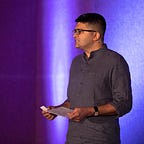The best and also the worst thing about social media and online magazines is the ease of being able to publish one's prejudiced & narrow-minded views on online mediums such as www.medium.com. It becomes easy to target saints among humans - colossal giants who through their life and death elevated the whole of humanity and blessed the rest of us with their presence.
It is neither new nor that only non-Indians have vilified and abused the Mahatma (Great Soul), Indians too have misunderstood and hated the man since he was alive.
However, none of this takes away from the fact that thorough his words and deeds his entire life, Gandhi set examples of what humans are capable of achieving and advancing:
- Ahimsa (non-violence and non-killing): not hating, of the 'other' whether it is foreign imperialists ruling and oppressing a nation, or across religious / linguistic divides, or caste lines
- Love of truth - at all costs
- Reconciliation and compromise to find the middle ground in confrontations with opponents: for the sake and betterment of one and all
- Simple living - barely eating enough to survive, travelling third class when he could fly in planes/ luxury cars, barest of possessions (during his later fasts his weight was below 50KG)
- Being above nepotism: his estrangement with his eldest son (who did not even attend Gandhi's cremation when it is considered a sacred duty among Hindu's that the eldest son sets fire to the funeral pyre of the father) the most basic cause of which was that Gandhi recommended a more deserving student to pursue higher education in the UK (over his eldest son) when the donor providing the scholarship has left the decision essentially in his hands to give it to anyone they deemed deserving.
- Cancelling a 1,000 British Pound insurance policy for his family when he started living the community life in South Africa; the logic being that if others did not have a financial cushion in case if the breadwinners untimely demise (mostly due to opposition to British rule), his family having one was morally wrong.
- Not being power hungry - closing down the biggest civil disobedience movement in Indian history till then in 1922 (of which he was the unqualified leader) due to one incident of violence by the satyagrahis against British police (must be mentioned that they too were Indian nationals of course)
- Having the guts to accept a Dalit (untouchable) family into Sabarmati Ashram in the teeth of opposition from traditionalists and despite the threat of cutting of funds for running the ashram. His role in bringing about rights of temple entry and reducing/ eliminating discrimination against untouchables is exemplary and second to no other politician or social reformer in India.
- Never shying from accepting and admitting errors in thinking and action, and being open to debate to improve oneself, to debate and change when the occasion/ situation demands.
- Finally and most important his ability to quench the fires of hatred that engulfed the entire subcontinent in the 1940s particularly before and after the partition of India in 1947 when rivers of blood were flowing across the subcontinent and it seemed humans had lost all sanity.
In that context always remember what Lord Louis Mountbatten, the last viceroy who had after independence of India become the Governor-General wired to Mahatma Gandhi:
"My Dear Gandhiji, in the Punjab we have 55,000 soldiers and large scale rioting on our hands. In Bengal our forces consist of one man and there is no rioting. As a serving officer, as well as an administrator, may I be allowed to pay my tribute to the One Man Boundary Force".
Such was the man - in whose presence even ordinary humans were inspired to rise above their pettiness and become both humane and 'humans'
If such a person is a fraud as you allege - I think Plato's allegory of the cave holds true and beliefs (even if false) will substitute knowledge.
Do try reading these books to have a better understanding of the Man, Mahatma Gandhi:
1. Gandhi: The Years That Changed the World by Ramachandra Guha
2. Mahatma Gandhi Autobiography: The Story Of My Experiments With Truth
3. The Life of Mahatma Gandhi Paperback by Louis Fischer
